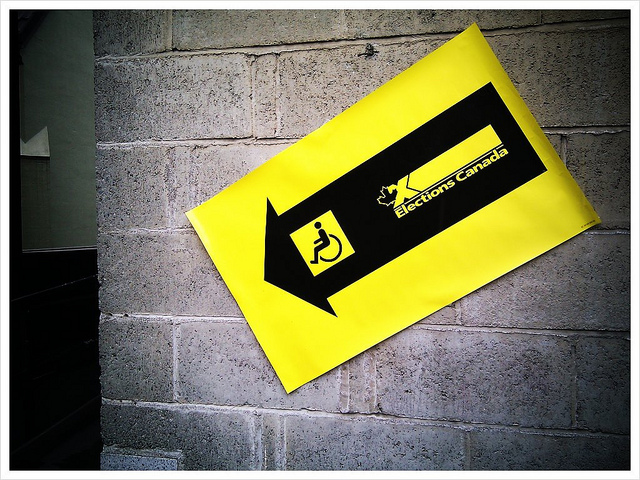Like this article? rabble is reader-supported journalism. Chip in to keep stories like these coming.
Are you sure you can vote? Are you sure that on election day you won’t be told that your ID, including your voter identification card from Elections Canada plus testimonials from sound citizens as to who you are that used to suffice, isn’t enough under the Harper government’s Fair Elections Act? It is the centrepiece of the Harper government’s assault on democratic process and arguably its most devious piece of work.
The problems it creates for maybe hundreds of thousands of voters, many of whom will give up trying or just be straight out disenfranchised, is just the tip of the iceberg. On that tip, the recent case of Vince MacLean, former leader of the Nova Scotia Liberal Party, is instructive. He tried to vote early at his lifelong poll outside Sydney, but couldn’t, despite a walletful of ID and being well known at the poll. The new law requires ID that proves a civic address matching your voter card, not the mailing address that driver’s licences and most other official identifications have.
This affects mostly rural people whose mailing address differs from their civic ones, people on the move, students, First Nations people and others. It can be fixed beforehand by contacting Elections Canada by email or phone and going through an annoying bureaucratic procedure, although many people won’t be able to or won’t bother. MacLean did eventually vote. But if you’re in those categories and show up flat-footed on election day, you won’t likely have time to fix anything.
Then there’s the less visible bit. When the law was introduced last year, a group of international scholars from the U.S., Europe and Australia expressed concern that “Canada’s international reputation as one of the guardians of democracy and human rights is threatened.”
Elections Canada has (had?) a stellar reputation among emerging democracies who would rather not deal with either the U.S. or the old European powers, and who took its advice in the struggle to advance democratic rights. We punch above our weight on this. The Harper law, however, could, because of Canada’s influential reputation, “harm standards of electoral rights around the world,” the scholars warned. Canadian experts, the federal and several provincial chief electoral officers kicked in with a long list of objections.
The key intent of the law is to strip Elections Canada of its powers. Its authority to investigate electoral fraud has been removed and given to the Office of Public Prosecutions, which doesn’t report to Parliament. Something like the Tory robocalls scandal (in which opposition voters in some ridings were misdirected to the wrong polls) could now pass unnoticed, and Elections Canada is even prohibited from communicating about robocalls to citizens. In fact, it is also prohibited from promoting voting. Plus, among other objectionable points meant to advantage the Tories, it exempts “fundraising expenses” from election spending limits and restores the influence of political parties in selecting polling officials.
The government’s stated reason for all this was to prevent “electoral fraud.” If we were an enlightened nation, we would be laughing these guys out of office for this instead of entertaining their possible re-election. The Harper party is above all the party of electoral fraud, believing itself above the niggling business of election laws. There have been Tory scandals in every one of their elections, and several Tories off to jail, including, recently, Harper point man Dean del Mastro, led off in chains.
On top of this, the law was introduced, in typical Harper fashion, at the last minute, with debate choked off. It was underpinned by the usual deceptions delivered by Harper hatchetman Pierre Poilièvre. After an assault by critics, the Tories backed off on a few minor points. For example, “vouching” had been banned — the practice whereby one known person swears to another’s identity — but was partially restored in that one person can attest to another’s civic address under restrictive conditions.
The real psychology behind this, however, is that Harper sees Elections Canada as “the enemy” — along with the courts, the media, civil servants, scientists and other fundamental agents of the Canadian state and democracy whose job it is to value facts, truth, due process and democracy itself above Harper’s paranoid totalitarianism. Elections Canada had been outing Tory fraudsters and that’s the crime for which it has been stripped of powers.
There’s also the question of whether the intent of this bill is in fact to suppress the vote — to discourage people who might have been inclined to vote against the Tories. If so, it could be backfiring, as student, Indigenous and other groups have sprung up across the country to get people registered. One can only hope.
Indeed, of all the reasons to give Harper the bum’s rush as he gnaws at the vital organs of the Canadian state, this democracy-warping law is surely at the top.
Ralph Surette is a freelance journalist in Yarmouth County. This column was first published in the Chronicle Herald.
Photo: Dennis S. Hurd/flickr
Like this article? rabble is reader-supported journalism. Chip in to keep stories like these coming.



